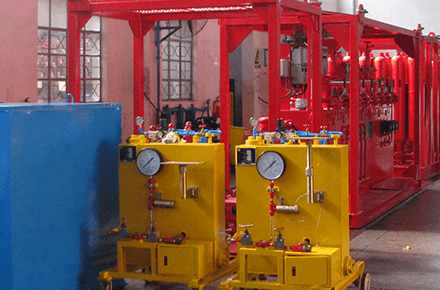The oil and gas industry is a complex and high-stakes field, where the safety and efficiency of operations are paramount. One of the critical components in ensuring this safety is the blowout preventer (BOP). BOPs are designed to control, monitor, and seal oil and gas wells to prevent blowouts – uncontrolled releases of crude oil or natural gas from wellheads. Given their crucial role, the repair and maintenance of blowout preventer equipment cannot be overstated. This article delves into the importance of BOP maintenance and repair, exploring the various aspects that make it indispensable in the oil and gas industry.
Blowout preventers are the last line of defense in preventing catastrophic blowouts that can result in significant environmental damage, loss of life, and financial loss. Regular maintenance and timely repairs are vital in ensuring that BOPs function correctly when needed. Failure to maintain these critical pieces of equipment can lead to malfunctions at crucial moments, leading to disastrous consequences. Proper maintenance involves regular inspections, testing, and servicing to ensure all components are in optimal working condition.

The oil and gas industry is heavily regulated, with stringent safety standards set by organizations such as the Occupational Safety and Health Administration (OSHA) and the American Petroleum Institute (API). Compliance with these regulations is mandatory, and regular maintenance and repair of BOPs are part of these requirements. Failure to comply can result in hefty fines, legal actions, and a tarnished reputation. By adhering to a rigorous maintenance schedule, companies can ensure compliance with these regulations, thereby avoiding legal complications and promoting a culture of safety.
Blowout preventers are significant investments, and their longevity is crucial for the financial health of oil and gas operations. Regular maintenance not only ensures the equipment's functionality but also extends its lifespan. Preventive maintenance, including cleaning, lubrication, and the replacement of worn-out parts, helps in reducing the wear and tear that can lead to premature equipment failure. This proactive approach can save companies substantial amounts of money by delaying the need for costly replacements and reducing downtime.
In the fast-paced oil and gas industry, operational efficiency is key to maintaining competitiveness. A well-maintained BOP ensures smooth and uninterrupted operations, minimizing the risk of unexpected breakdowns that can cause significant delays. Efficient BOP systems contribute to overall operational efficiency, enabling companies to meet production targets and timelines more reliably. This efficiency translates to better profitability and a stronger market position.
Blowouts are not only hazardous to human life and property but also have severe environmental consequences. Oil spills can devastate marine and terrestrial ecosystems, leading to long-term ecological damage. By ensuring that BOPs are well-maintained and function correctly, companies can significantly reduce the risk of such environmental disasters. This proactive approach to maintenance and repair demonstrates a company's commitment to environmental stewardship and corporate social responsibility.
Regular maintenance and repair of blowout preventers are integral to fostering a culture of safety within the oil and gas industry. When safety protocols are rigorously followed and equipment is kept in top condition, it sets a standard for all employees and stakeholders. This culture of safety permeates all levels of an organization, from top management to field personnel, promoting an environment where safety is prioritized over expediency. A strong safety culture not only protects workers and the environment but also enhances the overall reputation of the company.
The field of blowout preventer maintenance has seen significant advancements with the advent of new technologies. Remote monitoring systems, predictive maintenance tools, and advanced diagnostic equipment have revolutionized how maintenance is conducted. These technologies enable real-time monitoring of BOP conditions, allowing for early detection of potential issues and timely interventions. By leveraging these advancements, companies can further enhance the reliability and efficiency of their BOP maintenance programs.
Effective maintenance and repair of blowout preventers require skilled personnel who are well-versed in the latest techniques and technologies. Continuous training and skill development are essential to ensure that maintenance teams are equipped to handle the complexities of modern BOP systems. Investing in training programs and certifications not only enhances the competence of the workforce but also ensures that maintenance practices are in line with the latest industry standards.
The importance of blowout preventer equipment repairs and maintenance in the oil and gas industry cannot be overstated. Ensuring the operational safety, regulatory compliance, equipment longevity, and operational efficiency, while mitigating environmental impacts, are all critical aspects that underline the significance of regular maintenance. By fostering a culture of safety, embracing technological advancements, and investing in skill development, the oil and gas industry can continue to safeguard its operations, protect the environment, and maintain its competitive edge. The meticulous care of BOPs is a testament to the industry's commitment to safety, efficiency, and responsibility.
By continuing to use the site you agree to our privacy policy Terms and Conditions.